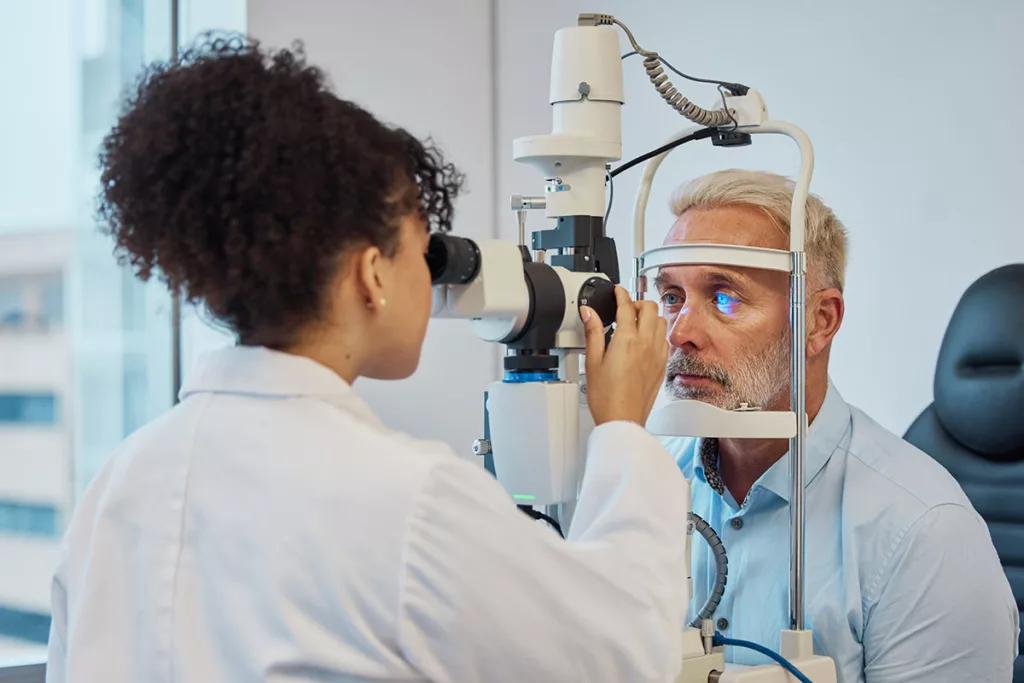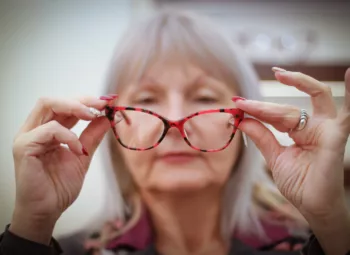
If you have trouble seeing at night, you’re not alone. In fact, millions of people experience worsened vision at night or in dim light. This is referred to as night blindness, or nyctalopia. If you’ve noticed your night vision getting worse, this could be a sign of underlying health conditions you should know about.
Symptoms of night blindness include:
- Vision appears cloudy or blurry in low light
- Trouble transitioning from light to dark environments
- Difficulty driving at night
- Harsh glares or halos around light sources
- Light sensitivity
Common Causes of Diminished Night Vision
Poor night vision usually has to do with conditions that impact the rod cells in your eye, which are essential for allowing your eyes to adjust to dark and light environments. Below, we list some common causes of diminished night vision.
Vitamin A Deficiency

Vitamin A, also known as retinol, is a nutrient that plays an essential role in the function of your retina. The retina is located in the back of your eye and is responsible for image processing. Without enough vitamin A in your body, your retina can’t work as well as it should. A Vitamin A deficiency is often the cause of diet or underlying health conditions. Luckily, plenty of foods are rich in vitamin A, such as kale, seaweed, carrots, fish oils, dairy, and much more.
Although incorporating vitamin A-rich foods into your diet is a great way to promote the longevity of your eye health, you should always tell your eye doctor if you’re experiencing any changes in your vision.
Zinc Deficiency
Zinc is an essential nutrient for eye health and retina function as well. This important mineral can even help prevent eye diseases like macular degeneration. However, when your body doesn’t get enough zinc, this can cause vision problems such as night blindness.
A great way to increase your zinc intake naturally is through your diet. Meats, shellfish, dairy, eggs, and legumes are all excellent sources of zinc.
Age & Presbyopia
As we age, our eyes undergo changes that can affect our vision. This natural deterioration is called presbyopia. As you get older, your pupils can begin to dilate less in dimly lit environments. This makes it harder for light to enter the eye when it’s dark.
Your cornea also might grow less clear, which can cause bright lights to create a glare when it’s dark outside. Both of these effects can negatively impact your night vision.
Myopia (Nearsightedness)

Nearsightedness, also called myopia, is a condition caused by a refractive error in the eye. Nearsightedness causes faraway objects to appear blurry and can in some severe cases it can also cause vision issues in low lighting.
A glasses or contacts prescription is a great treatment option for nearsighted patients. LASIK eye surgery is also an incredibly effective treatment option for nearsightedness.
Excessive Sun Exposure
Spending a lot of time in the sun without eye protection can increase your exposure to harmful UV rays. This can lead to temporary night vision loss that usually clears up in 2-3 days. However, make sure to see an eye doctor if your symptoms persist.
Cataracts
Poor night vision is a very common symptom of cataracts, which is a generative eye disease that occurs when proteins in the eye clump together and cloud the lens. Many patients with cataracts have difficulty seeing at night due to the clouding effect the condition causes. Luckily, cataract surgery can permanently remove the cataracts and completely restore your vision.
Glaucoma
A common early symptom of glaucoma is night blindness. Glaucoma is caused by damage to the optic nerve due to pressure build-up in the eye. This damage can lead to vision loss, making glaucoma one of the leading causes of blindness.
Diabetic Retinopathy

Diabetic Retinopathy is an eye condition caused by high blood-sugar levels damaging the blood vessels in your retina resulting in vision changes such as night blindness. Unfortunately, in many cases, vision changes only occur when the disease has progressed into severe stages.
Early diagnosis and treatment of diabetic retinopathy are essential to reducing the risk of vision loss. If you have diabetes or there is a history of diabetes in your family, it’s important to have annual comprehensive eye exams.
Macular Degeneration
Age-related macular degeneration (AMD), often shortened to macular degeneration, is an eye disorder caused by damage to the central part of the retina known as the macula. This causes vision loss in the center of the eye. In some cases, poor night vision has been an early symptom of macular degeneration.
Retinitis Pigmentosa (RP)
Retinitis pigmentosa (RP) is a rare genetic condition that leads to vision loss. This disorder causes retina cells to degenerate over time, which can eventually cause blindness. One of the earliest symptoms of RP is poor night vision, or difficulty adjusting to dim lighting. Although researchers are still developing a cure, some rehabilitation techniques can help patients with RP maximize their vision.
Night Vision Loss Diagnosis and Treatment
Changes in your night vision can be caused by a number of things, including various degenerative eye diseases. A simple eye exam is all it takes to identify the potential underlying causes of poor night vision and determine the best treatment option. Fill out the form below to schedule an appointment with an eye doctor in Union City at NeoVision Eye Center.
Schedule an Eye Exam at the First Sign of Poor Night Vision
If you think you’re experiencing night blindness, or any changes in your night vision at all, don’t wait to tell an eye doctor. Schedule a comprehensive exam at NeoVision Eye Center in Union City today by filling out the form below.
"*" indicates required fields





